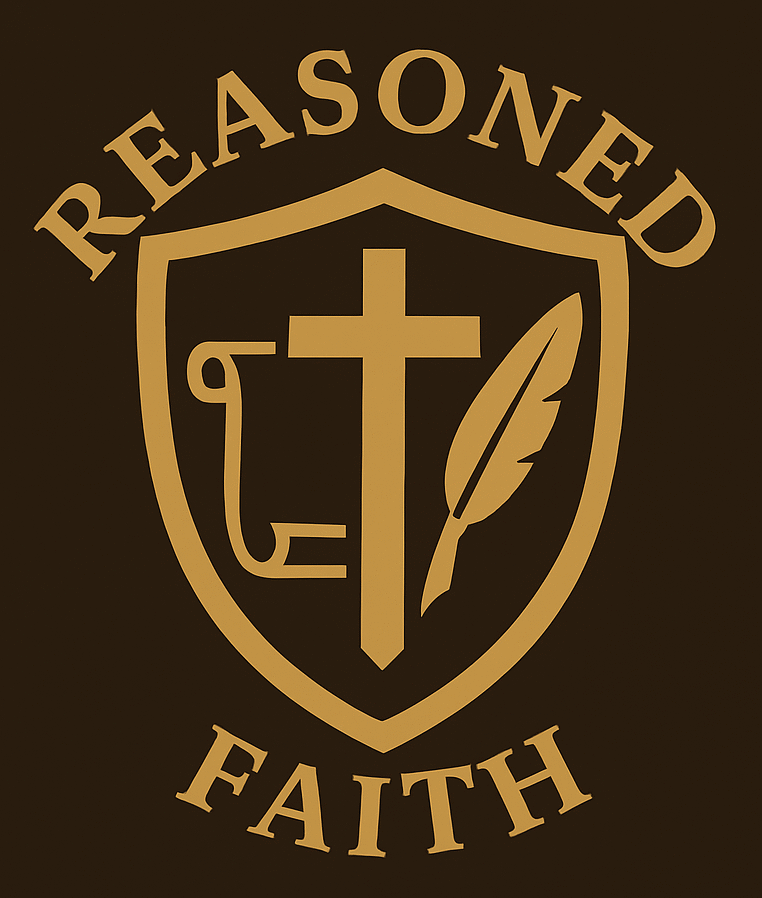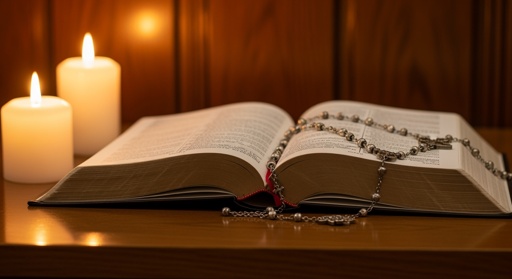
Many Christians believe the Bible is the only authority needed for faith. The phrase “Sola Scriptura”—Scripture alone—became a rallying cry during the Protestant Reformation. But is that belief rooted in Scripture itself? And how does the Catholic Church understand the role of the Bible?
The Catholic Church reveres the Bible as the inspired, inerrant Word of God. But she does not teach that it is the only authority. Instead, Catholics hold that Sacred Scripture, Sacred Tradition, and the Magisterium (the teaching authority of the Church) work together, forming a unified foundation for the Christian faith.
What Is Sola Scriptura?
Sola Scriptura is a doctrine held by most Protestants, teaching that the Bible alone is the ultimate authority for all Christian doctrine and practice. However, it’s important to note that there isn’t a single agreed-upon definition among Protestants. Some believe that Scripture is the only authority. Others say it’s the final authority, with tradition and reason playing a secondary but still valid role.
This inconsistency leads to confusion even among those who claim to follow Sola Scriptura. If a central doctrine of Protestantism has no single definition, how can it function as a solid foundation for unity?
And in practice, this lack of clarity has led to thousands of denominations, each interpreting Scripture differently. While the Bible is the common book, the conclusions drawn from it vary widely—because without a living, authoritative interpreter, each individual becomes their own pope.

How Does the Catholic Church View Scripture?
Catholics firmly believe the Bible is the inspired Word of God, useful for teaching, correction, and training in righteousness (2 Timothy 3:16). But the Church does not isolate Scripture from its proper context.
According to the Catechism of the Catholic Church (CCC 80–82), Divine Revelation comes to us through both Sacred Scripture and Sacred Tradition. These are inseparably linked and flow from the same divine wellspring. The Church teaches that the apostles passed on what they received both orally and in writing (cf. CCC 76).
The Magisterium—the pope and bishops in union with him—serves as the interpreter of the Word of God, ensuring consistency and fidelity to the deposit of faith. This teaching authority does not add to or take away from God’s Word but helps the Church stay faithful to it (cf. Dei Verbum 10).
The Problem with Scripture Alone
Ironically, the Bible nowhere teaches Sola Scriptura. In fact, it points to a more complex picture.

- 2 Thessalonians 2:15 – Paul urges believers to “stand firm and hold fast to the traditions… whether by word of mouth or by letter.”
- Acts 8:30–31 – The Ethiopian eunuch reads Isaiah but admits he cannot understand it without guidance. Philip doesn’t just hand him a commentary—he explains it to him.
- 1 Timothy 3:15 – Paul refers to the Church, not Scripture, as the “pillar and foundation of truth.”
The early Church didn’t even have the complete New Testament for decades. The teachings of Jesus and the apostles were preserved and passed down through oral preaching and lived tradition. The canon of Scripture wasn’t formally closed until the 4th century, under the guidance of Church councils.
Scripture, Tradition, and the Magisterium
The Catholic Church holds that Scripture, Tradition, and the Magisterium are like a three-legged stool. Remove one leg, and the whole structure collapses.

Dei Verbum 10 says, “It is clear therefore that, in the supremely wise arrangement of God, Sacred Tradition, Sacred Scripture and the Magisterium of the Church are so connected and associated that one of them cannot stand without the others.”
The Magisterium does not stand above Scripture—it is its servant. It teaches only what has been handed on. This ensures the faithful are not left to navigate doctrine on their own but are guided by the same authority Christ gave to the apostles.
Did the Early Church Believe in Sola Scriptura?

No. The early Church Fathers held Scripture in high esteem but never taught that it alone was sufficient.
- St. Irenaeus emphasized apostolic succession as the safeguard of true teaching.
- St. Basil the Great acknowledged that some traditions “we have received from the unwritten teaching.”
The very formation of the biblical canon came from the Church’s discernment—guided by Tradition and the Holy Spirit. Without the Church, we wouldn’t even know which books belong in the Bible.
What Happens When Scripture Alone Is the Only Authority?

One major result of Sola Scriptura is division. Without a unifying teaching authority, differing interpretations of Scripture have led to over 30,000 Christian denominations worldwide.
Protestants often respond by saying, “Well, Catholics disagree too.” And it’s true—Catholics can be disobedient, confused, or poorly catechized. But here’s the difference: the Catholic Church has a single, unified teaching. Whether or not every Catholic follows it, the official doctrines are clear and consistent.
In Protestantism, the disagreement is built into the structure—there is no authoritative voice to settle disputes. In Catholicism, disagreement occurs despite the structure, not because of it.
Does the Catholic Church Diminish Scripture?
Quite the opposite. Scripture is foundational to Catholic worship and life.
- The Mass is saturated with Scripture—from the readings to the prayers to the Eucharistic liturgy itself.
- Catholics hear more Scripture at Mass over three years than many Protestants hear in a year of church services.
- Devotions like the Rosary are rooted in biblical meditations.
St. Jerome famously said, “Ignorance of Scripture is ignorance of Christ.” The Catholic Church takes this seriously.

Conclusion: Why the Catholic View Is Fuller
Sola Scriptura seems noble on the surface—but it cannot support the weight of Christian faith on its own. The Bible is the Word of God, but God never intended it to stand alone.
Jesus didn’t leave us a book; He left us a Church, built on the apostles, guided by the Spirit, and protected by His promise.
In the Catholic Church, Scripture is not diminished—it’s fulfilled, interpreted, and lived out in unity with Tradition and the Magisterium. That’s the fullness of God’s plan.
📚 Want to Go Deeper?
These four key sources are worth reading:
*This post contains affiliate links. If you make a purchase through these links, I may earn a commission at no extra cost to you. As an Amazon Associate I earn from qualifying purchases.
- Sola Scriptura Doesn’t Work- 25 Practical Reasons to Reject the Doctrine of ‘Bible Alone’ Paperback, by Joel S Peters
- The Bible Alone? Paperback – January 1, 2016, by Marcus Grodi
- Scripture Alone? 21 Reasons to Reject “Sola Scriptura” Paperback, by Joel S. Peters
- 100 Biblical Arguments Against Sola Scriptura , Paperback, by Dave Armstrong


This was a very thoughtful and well-presented explanation of the Catholic perspective, Emilio. While I come from a Protestant background and hold firmly to the traditional doctrine of Sola Scriptura—that Scripture alone is the final and sufficient authority for faith and life—I appreciate the clarity with which you laid out the Catholic position.
I believe Scripture is God-breathed and fully sufficient to equip believers for every good work (2 Timothy 3:16–17), and that any tradition or teaching must be tested against it. That said, I value discussions like this that seek understanding rather than division. Thank you for sharing your perspective with grace and depth!
Thank you so much for your kind and thoughtful comment. I truly appreciate your gracious tone and your desire for dialogue rooted in understanding rather than division.
I do agree with you—at least in part—on an important point: no Tradition or Church teaching can ever contradict Scripture. That principle was held by the early Christians and affirmed by the Early Church Fathers. When heretical groups emerged and misused Scripture to promote distorted versions of the Gospel, the early Church responded by appealing to both Scripture and the apostolic Tradition handed down through the bishops to refute the errors and preserve the true faith. This unity between Scripture, Tradition, and teaching authority has been essential from the beginning.
As Catholics, we also believe that all Scripture is God-breathed and “profitable… so that the man of God may be complete, equipped for every good work” (2 Timothy 3:16–17). But while this passage rightly upholds the authority and divine origin of Scripture, it doesn’t say that Scripture is fully sufficient in the sense that nothing else is needed—not even apostolic Tradition or the teaching office of the Church. That phrase—“fully sufficient”—doesn’t appear in the text or elsewhere in Scripture.
As I pointed out in the article, the word used is profitable (or “useful”), not “exclusive” or “all-sufficient.” Saying that something is profitable for equipping doesn’t logically mean it’s the only source of equipping. We must be careful not to read into the text a concept—Sola Scriptura—that the Bible itself never actually teaches.
Thank you again for your thoughtful engagement. I truly value conversations like this where we can share, challenge, and sharpen each other with mutual respect and a shared love for Christ and His Word.
Emilio, thanks for the thoughtful and clear explanation of the Catholic view. I come from a Protestant background and hold to Sola Scriptura—Scripture alone as the final and sufficient authority for faith and life. I believe the Bible is God-breathed and fully equips believers for every good work (2 Timothy 3:16–17), so every tradition or teaching should be tested against it. Even so, I value conversations like this that aim for understanding rather than division. I appreciate the grace and care you brought to the discussion.
Thank you for sharing
God Bless You
Elke
Elke, thank you so much for your kind words and for sharing your perspective with such grace. I really appreciate your desire for understanding over division—it’s exactly the kind of conversation that builds bridges rather than walls.
You mentioned 2 Timothy 3:16–17, which is such a beautiful passage. As Catholics, we wholeheartedly affirm that Scripture is “God-breathed” and equips us for every good work. But we also notice that Paul doesn’t say Scripture alone is sufficient or the sole authority—only that it is inspired and useful. For example, in the very same letter (2 Timothy 2:2), Paul reminds Timothy to hand on what he has heard to others who can teach. That’s tradition in action—the living transmission of the faith alongside Scripture.
The Catholic conviction is that Jesus entrusted both the written Word and the apostolic teaching (what Paul calls “tradition,” paradosis in Greek) to the Church, and that they work together in harmony, never in contradiction. The early Christians lived by this pattern before the New Testament was even completed, which shows us that the Church was never meant to rely on Scripture apart from the teaching authority Christ gave it.
I truly value your thoughtful engagement here. These are deep questions, and our shared love for Christ and His Word gives us a lot of common ground. May the Holy Spirit continue to guide both of us into all truth (John 16:13).
God bless you, Elke!